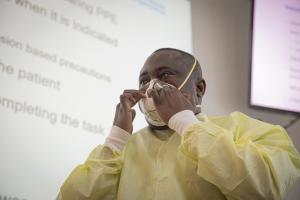Equipping Tanzanian health workers with skills for critical care
Dar es Salaam — Health care workers across Africa are boosting their emergency response skills to tackle COVID-19. Much is still being learned about the pandemic as measures are reinforced to contain rising infection in many countries in the continent. “We were in completely unchartered territory,” says Dr Abel Musa, a critical care specialist at a hospital in Zanzibar, after a recent online training.
In April, Dr Musa along with about 160 other health workers in Tanzania attended a three-day virtual training organized by the Ministry of Health and the World Health Organization (WHO) focusing on caring for critically ill COVID-19 patients. Only a small percentage of COVID-19 patients become critically ill necessitating intensive care, which is the only measure that can save their lives.
Critically ill patients are at a heightened risk of experiencing acute respiratory disease syndrome, septic shock, multi-organ failure, kidney or cardiac injury. These patients require increased attention, with around the clock monitoring. They may also need oxygen support. The professionals caring for these patients are often the last line of defence against the disease.
“If the essential care of such critical illness is provided correctly, including maintaining a free airway, administering oxygen and giving intravenous fluids to patients in shock, many lives can be saved,” says Dr Tim Baker, a critical care consultant with WHO Tanzania.
Providing critical care also entails important measures such as how to identify severe and critically ill patients, assessing a patient’s breathing and oxygen needs, how to administer oxygen, and treating shock or low levels of consciousness. Globally, around 3% of COVID-19 patients become critically ill. The majority present fever, cough and shortness of breath as symptoms. About 40% of cases seem to be mild.
Dr Musa says that the training has given a fillip to infection prevention and control (IPC) procedures at Tasakhtaa Global Hospital, where he works. He had initially established standards to handle COVID-19 patients, but with the training, the latest in an ongoing series, the protocols have been adjusted in line with nationally recommended practices.
“We have a number of COVID-19 patients in our critical care. Because of careful planning and staff commitment to IPC we have managed to keep other patients and all frontline responders safe,” says Dr Musa.
WHO is working with governments in Africa to train health workers, improve surveillance, testing, contact tracing and treatment. More than 7000 health workers, including over 400 in Tanzania, have been trained in WHO African Region since the beginning of the pandemic. WHO is also providing technical expertise in countries, either remotely or by embedding experts in national response teams.
Most countries on the continent, however, do not have the capacity to manage many critically ill COVID-19 patients. There are on average nine intensive care unit beds per one million people, according to a March 2020 survey based on self-reports by 47 countries in the WHO African Region. Improvements are being made to increase the number of ventilators in intensive care units and more critical care clinicians are being trained.
Ansbert Sweetbert Ndebea, a doctor from Tanzania’s Kilimanjaro region who also attended the virtual training, says he has yet to handle a critically ill COVID-19 patient but was now prepared to do so. His region has not reported a high number of cases.
For Dr Musa, the new protocols at his hospital mean patients are now being screened upon entry. If triage staff suspect a COVID-19 case, the person is taken to an isolation area until staff designated to care for COVID-19 patients arrive. COVID-19 care is limited to specific staff members to ensure that other essential health services continue. These newly formed COVID-19 teams work under modified schedules, serving for 14-day stretches before taking two weeks to rest. The method helps the treatment teams to stay focused and reduces the likelihood of onward infection.
With improved infection prevention measures, the safety of health workers also gets a boost. As of 19 May 2020, 1920 health workers had been infected with COVID-19 in 32 counties in the WHO African Region since the beginning of the outbreak.
Infections continue to rise across the continent. However, the pandemic can still be controlled in many countries by the aggressive implementation of both containment and mitigation measures. Recent analyses of the evolution of the outbreak in Africa show that the disease has largely affected urban populations, with most rural communities relatively unaffected or only reporting sporadic cases.
Communications and Media Officer
WHO Country Office, United Republic of Tanzania
Tel:+255 22 2111718/2113005
Mobile:+255 743 958599
Email: mwijarubim [at] who.int
Communications and marketing officer
Tel: + 242 06 520 65 65 (WhatsApp)
Email: boakyeagyemangc [at] who.int



